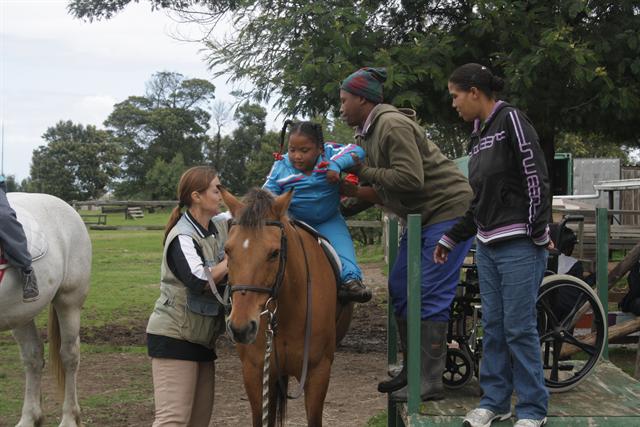Their interaction with three gentle horses, combined with the patience and care of riding instructor André Leverne, has brought about positive changes in the children. They are improving on a physical, mental and emotional level, says André. And this has happened with only two sessions a month over the past six months.
The visits to the centre are a highlight in the children's routine. Lined up in a row in their wheelchairs next to the ring, they can barely contain their excitement while awaiting their turn on one of the good-natured horses. Once their turn comes, they are pushed up onto a ramp in their wheelchairs and from there lifted onto a horse - and off they go.
"We see a wide spectrum of special needs children, including those with foetal alcohol syndrome, autism, Down's syndrome, emotional and mental disabilities and also Aids orphans. I also have a lady with multiple
sclerosis who comes weekly for sessions and is benefiting immensely. We've had an autistic boy who started speaking out of the blue because of the therapy. He now excels at school."
André is assisted by Peggy Bentall who helps as a volunteer. She is enthusiastic about every improvement they witness in the children and descibes how little Kayla August (5) took to the therapy: "She bellowed through her first two sessions, so we just let her sit on the horse. From her third session she was hooked and now we can't get her off."
Another girl who self-mutilated and was very aggressive, has almost stopped her destructive behaviour since she started with the therapy.
Lisa McCallum of the South African Riding for the Disabled Association (Sarda) explains that children who are not able to walk derive great benefit, as the horse's movement moves the human pelvis in exactly the way the pelvis would move when the human is walking. "In one walk stride of the horse, the seated child has to re-balance eight times, so the horse becomes one of the most dynamic therapeutic tools available. Riding also motivates children with learning disorders to increase their levels of gross and fine motor control, concentration, attention, self-awareness, self-confidence and patience," says McCallum.
Adds André, "This type of therapy is not taking place in a sterile environment where the focus is on the patient who has to perform for the therapist. Here the focus is off the child and he/she concentrates on the horses. They learn to ride, pat and brush them.
"There is a connection that takes place between a specific needs child and a horse on a level that we really cannot explain."
André likes to believe that horses were placed on earth as healers and not racers and competitors.
Sponsorship
Rainbow Riders is is based at the George Riding Club. It is a registered non profit organisation and desperately needs sponsorship to enable more children to benefit from the therapy. They also have an urgent need for an additional shipping container to enable them to split their office from the tack and feed storage.
"Sponsorship will be deeply appreciated," says André.
Call her on 072 530 8954 and visit the website on www.rainbowriders.co.za.

Rainbow Riders co-facilitator Judy Bentall and assistant Joseph Nkopana help little Kayla August (5) from her wheelchair onto the horse. Geraldine Pietersen, an educator at Optima, is standing on the right.
ARTICLE AND PHOTOS: ALIDA DE BEER, GEORGE HERALD JOURNALIST
















